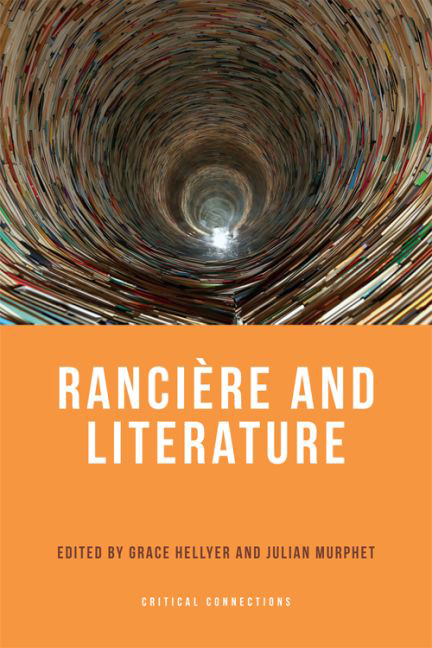Introduction: Rancière and Literature
Published online by Cambridge University Press: 15 September 2017
Summary
It would be difficult to construe the course of modern French philosophy apart from its remarkably intimate relationship with literature, both as a prime material for thinking and as the very medium in which many of its best propositions are framed. Of all the great modern national traditions in philosophy, none is so circumvolved with its culture's literary heritage, or indeed with that ‘world republic of letters’ whose headquarters and Greenwich meridian will always have been Paris. In no other country, for instance, can a figure like Sartre – novelist, playwright, philosopher, essayist – even be imagined, at least since the sui generis intellectuals of the Renaissance and Enlightenment: Bacon, Rousseau and Goethe himself. The difficulty simply in classifying thinkers like Bataille, Blanchot, Lacan, Cixous and Derrida rests largely upon the degree to which their prose is defined by an acute self-consciousness and ‘literariness’ that deconstructs in advance any too-rigid distinction between philosophy and poetry, theory and écriture. The unique importance of a journal like Tel Quel (1960–82), both to the leading philosophical and to the avantgarde literary figures of its moment, is emblematic. In France, or at least in its capital, to think is above all to write, in a way quite distinct from the empirical traditions of the anglophone world, or the speculative idealism of German thought.
Each luminous name in the pantheon of ‘French Theory’ summons up its own minor canon of literary auteurs, who in one way or another allowed the thinker in question to articulate otherwise intractable problems. Derrida's critical relationships with Artaud, Joyce, Celan, Mallarmé and Kafka shadow his more celebrated engagements with Rousseau, Lévi-Strauss, Husserl and Heidegger; Kristeva, a novelist in her own right, began her career in Theory with penetrating researches into the avant-garde poetics of Lautréamont and Mallarmé; Foucault's well-known love of Dostoevsky, Borges and de Sade, alongside his major study of Roussel, clarify the literary foundations of his thinking; Deleuze predicated much of his extraordinarily heterodox project on the works of Lewis Carroll, Kafka, Woolf, Melville and Proust; and while Lyotard was more of a student of the visual arts, there is no denying the prodigious debts owed by Badiou (also a playwright), Nancy, Irigaray, Kofman and Lacan to their own constellations of presiding literary geniuses.
- Type
- Chapter
- Information
- Rancière and Literature , pp. 1 - 22Publisher: Edinburgh University PressPrint publication year: 2016

